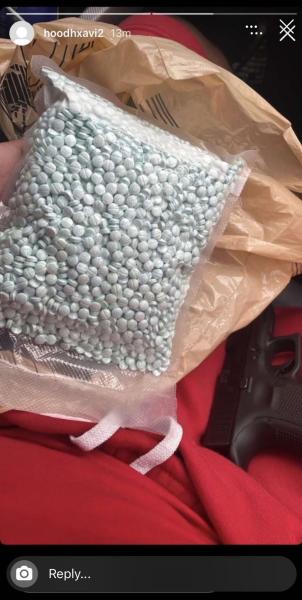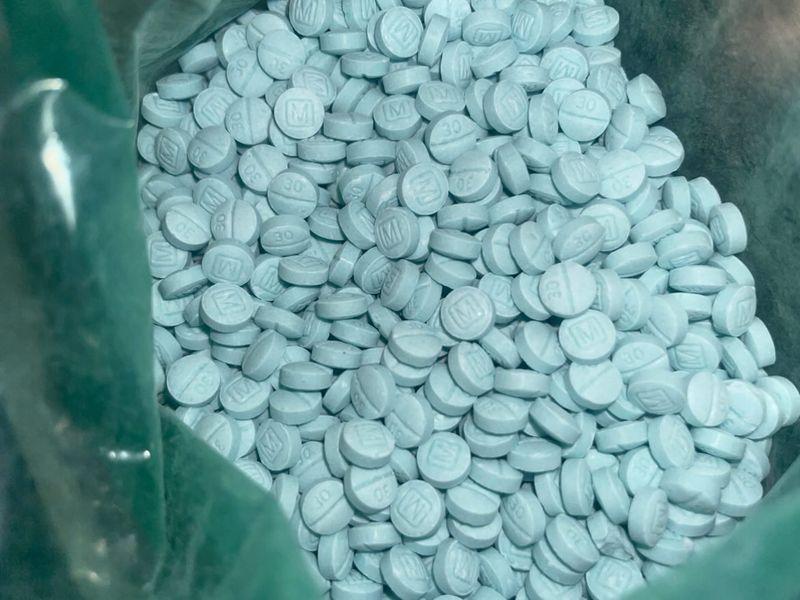Supplier in Juvenile Fentanyl Overdoses Case Charged with Drug Conspiracy


DALLAS, TEXAS - A top source of supply in the Carrollton fentanyl overdoses case has been charged with a federal drug crime, announced U.S. Attorney for the Northern District of Texas Leigha Simonton.
Jason Xavier Villanueva, 22, was charged via criminal complaint with conspiracy to distribute a Schedule II controlled substance. He was arrested on Tuesday and made his initial appearance in federal court Wednesday afternoon.
According to the complaint, Mr. Villanueva allegedly worked through a juvenile dealer to supply fentanyl-laced pills to Luis Eduardo Navarrete, 21, and Magaly Mejia Cano, 29, the pair accused of peddling pills to teenage dealers in Carrollton. Mr. Villanueva also allegedly transacted with some of the teenage dealers directly.
Mr. Navarrete and Ms. Cano were charged via criminal complaint with conspiracy to distribute controlled substances last week and remain detained pending trial.
“Fentanyl is killing our kids. We are angry about it. We are heartbroken about it. And we are determined to do all we can about it,” U.S. Attorney Leigha Simonton said at a press conference Wednesday afternoon. “Make no mistake: Unless it comes from a licensed medical provider, that pill your child thinks is Percocet, or OxyContin, or Xanax, or Adderall, may actually be fentanyl. And if it is fentanyl, chances are, even a small part of one pill may be deadly.”
“Fentanyl does not discriminate by age, race, gender, or socio-economic status. Its addictive properties cannot be compared to anything else on the streets today. The overdose and poisoning margin of error between life or death is microscopic,” DEA Dallas Special Agent in Charge Eduardo A. Chávez said at the press conference. “We all have a role in this fight. Because it is a fight. It is a fight for our families, it is a fight to curb substance abuse, and it is a fight to hold criminal drug networks accountable for their actions.”
“We take this seriously in our community; we will leave no stone unturned to ensure the safety of our children,” said Carrollton Police Chief Roberto Arredondo.
All three defendants allegedly trafficked pills, mostly blue tablets inscribed “M-30,” to juvenile dealers in Carrollton, who went on to sell to friends and classmates.
The drugs led to as many as ten overdoses, three of them fatal, of nine teenagers in the Carrollton Farmer’s Branch Independent School District. The victims, all middle and high school students, ranged in age from 13 to 17 and usually referred to the pills with slang terms like “percs,” “yerks,” “blues,” or “M-30s.”
According to the complaint, three of the surviving overdose victims identified two juvenile dealers as their sources for pills. Evidence showed that both juvenile dealers corresponded with Mr. Villanueva over social media about drug purchases, and one even admitted to law enforcement that Villanueva was his supplier.
In an interview with law enforcement following his arrest, Mr. Navarrete allegedly revealed that he, too, obtained the drugs he allegedly dealt to minors from Mr. Villanueva through one of the juvenile dealers.
Mr. Villanueva allegedly posted photographs of “M30” pills, money, and firearms on social media. He used the message function on a popular social media app to negotiate drug transactions with juvenile dealers and described the quality of the pills he was selling to his customers.
Following Navarrete and Cano’s arrests last week, Mr. Villanueva posted on social media, “Only thing that’s gonna stop us is feds.”
A criminal complaint is merely an allegation of criminal conduct, not evidence. Like Mr. Navarrete and Ms. Cano, Mr. Villanueva is presumed innocent until proven guilty.
If convicted, the defendants face up to 20 years each in federal prison.
The Drug Enforcement Administration’s Dallas Field Division and the Carrollton Police Department conducted the investigation with the assistance of School Resource Officers from the Carrollton – Farmer’s Branch Independent School. Assistant U.S. Attorneys Phelesa Guy and Rick Calvert are prosecuting the case.
Note: Illicitly produced, fentanyl-laced pills often look similar to legitimate prescription pills like Oxycontin or Percocet, but can pose significantly more danger. On the street, these pills are often referred to as “M30s” (a reference to the markings on some of the pills), “blues,” “perks,” “yerks,” “china girls,” or “TNT.” DEA research shows that six out of ten pills laced with fentanyl contain a potentially lethal dose. One pill can kill. For resources, visit https://www.dea.gov/onepill.


